How the coronavirus is overwhelming a Madrid cemetery
Father José Luis Sáenz is saying the final prayers for more than 30 people a day at the Cementerio Sur in the Madrid region, spending just seven minutes on each funeral
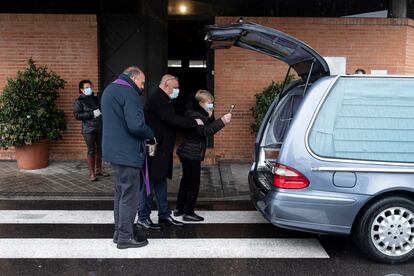

When he hears the sound of the engine, the priest emerges through the door of the chapel. The funeral car has just stopped outside. It’s carrying a sealed coffin containing the body of a 100-year-old woman. Father José Luis Sáenz, who is in charge of the final prayer for the deceased at the Cementerio Sur de Madrid (Madrid South Cemetery), adjusts his mask and his purple stole.
“Any relatives?” he asks the driver.
“No, I don’t think there are any,” comes the reply.
“OK. Open the rear.”
“I understood that it was better to…”
“Do it, please,” the chaplain insists.
The funeral worker complies, revealing a simple wooden coffin, with no adornments. It’s a cold and rainy day at the end of March. The priest, tall and stooping, is praying at the top of his voice. The raindrops are running down his face. He states the name of the deceased with vigor, having read it from a piece of paper a moment ago. Then he throws holy water over the casket.
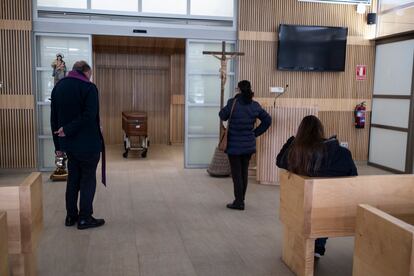
The process is simple and somber. The old lady’s body can now be laid to rest in one of the thousands of niches that are arranged in rows throughout the cemetery, like buildings in a miniature city. There is no time to lose. There is a convoy of funeral cars waiting behind this one. As the coronavirus epidemic continues to ravage Spain, the gravediggers are working non-stop. The crematorium is working 24 hours a day.
Municipal cemeteries in Madrid have been receiving around 120 bodies on a daily basis since March 9, according to data supplied by the Municipal Funeral Services Company. There are currently 40 burials a day, when this time last year there were 20. Cremations have also shot up, from 30 to 70. The majority of families opt to take the ashes home in a green urn, the one that is included on insurance policies.
The work of the chaplain has also tripled. This morning he has two sheets of paper full of names. Isabel (83), Ángel (88), Manuel (81), Manuela (108). He spends six minutes on each blessing. He always uses the same phrases, with a few variations. “In 20 years, I’ve only got the name wrong on one or two occasions,” he explains. “I was embarrassed. If it happens, I repeat the right name four times.” When he can rest, he finds refuge at the back of the chapel, where he reads Plato or books about eschatology, the branch of theology concerned with death and judgment. But today there isn’t much time for reading. The dead are arriving in waves.
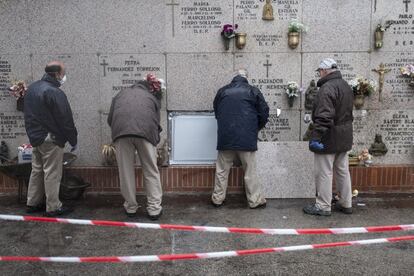
The pandemic has changed the customs of the funeral rites. Only three mourners are permitted, turning funerals into an intimate and sometimes confused act. Some come alone and remain silent. Others broadcast the moment to the rest of their family via videoconference. Some turn up with their mouths covered, masks on and wearing swimming goggles. They keep two meters apart. Some end up soaked by the rain, without being able to share an umbrella. They can’t even open the caskets, just to make sure it is their loved one inside. “Are you sure it’s my dad?” one man asks, stood by the casket of his father, a former boxer.
In Spain, funerals happen quickly, 24 or 36 hours after death. In other cultures, the process can last weeks or even months. But since the coronavirus arrived, the time frames have lengthened. The system is not prepared to process so many bodies. The overflow in hospitals, senior residences and funeral homes is leaving cadavers in a bureaucratic limbo for days at a time, sometimes even weeks.
That was the case for Manuel Álvarez, a flyweight boxer who was the Spanish champion in the 1960s. He died seven days ago in a senior home. His death certificate states that a “respiratory infection” killed him. He was not tested for the coronavirus. His body spent five days in a freezer at a funeral home. His children called three times a day, greatly concerned. The file was misplaced a number of times along the way. This morning the family was contacted at 9.37am to tell them that the funeral would take place at 12.10pm. They dressed for the occasion and arrived on time. In the chapel, they realized that the coffin before them was not that of their father. They had to wait another hour for it to arrive. They became increasingly angry.
The priest, José Luis, was aware of their misfortune. “You called your father Lolo,” he said during his prayers. “You have gone through a very tough week. Vicissitudes that have humiliated you and that need the mercy of God.” When it was over, one of the sons took a photograph of the marker on the niche. They didn’t want to lose track of their father again – especially not in this labyrinth of granite.
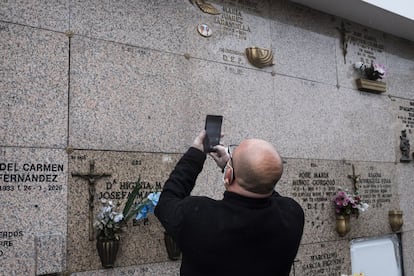
These stories weigh heavy on the priest, 74-year-old José Luis, and drive him to his books about life after death. “They say that I am at risk, or whatever,” he says “I trust in God’s plans.” He doesn’t care that he is working flat out in a place like a cemetery, even though they are hotspots for infection. A total of 102 employees at the municipal cemetery are currently off sick.
When the morning is over, Father José Luis hands over the duties to Eduardo Batubenga, a priest from the Democratic Republic of the Congo. He blesses the coffins, before they enter the cremator.
Today, however, José Luis is taking more time over the process for a daughter who is in great pain. Her father has died suddenly from the coronavirus, aged just 60. The priest speaks in front of the casket, just before it enters the cremator.
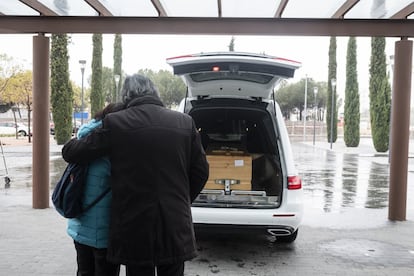
“Before the door is closed, I pray for his rest, but not the rest of death, but the eternal rest, that only God can grant. Now I shall close the door,” he says.
The daughter gets to her foot and stops the mechanism with her foot.
“Check that it is my father,” she says.
“It is,” the priest replies calmly.
“Open it!” she shouts.
José Luis holds firm, somber and contained.
The young woman withdraws. Before she leaves, she shouts: “God doesn’t exist, and he never has done.”
English version by Simon Hunter.
Tu suscripción se está usando en otro dispositivo
¿Quieres añadir otro usuario a tu suscripción?
Si continúas leyendo en este dispositivo, no se podrá leer en el otro.
FlechaTu suscripción se está usando en otro dispositivo y solo puedes acceder a EL PAÍS desde un dispositivo a la vez.
Si quieres compartir tu cuenta, cambia tu suscripción a la modalidad Premium, así podrás añadir otro usuario. Cada uno accederá con su propia cuenta de email, lo que os permitirá personalizar vuestra experiencia en EL PAÍS.
¿Tienes una suscripción de empresa? Accede aquí para contratar más cuentas.
En el caso de no saber quién está usando tu cuenta, te recomendamos cambiar tu contraseña aquí.
Si decides continuar compartiendo tu cuenta, este mensaje se mostrará en tu dispositivo y en el de la otra persona que está usando tu cuenta de forma indefinida, afectando a tu experiencia de lectura. Puedes consultar aquí los términos y condiciones de la suscripción digital.








































